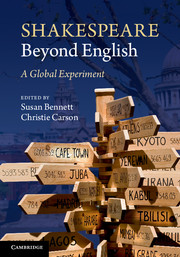Book contents
- Frontmatter
- Contents
- List of Illustrations
- List of colour plates
- Notes on contributors
- Foreword
- Acknowledgements
- Introduction
- The Globe to Globe Festival: An Introduction
- Performance Calendar
- Week One
- Chapter One U Venas no Adonisi
- Chapter Two Festival showcasing and cultural regeneration
- Chapter Three ‘What's mine is yours, and what is yours is mine’
- Chapter Four ‘The girl defies’
- Chapter Five Pericles and the Globe
- Chapter Six Technicolour Twelfth Night
- Week Two
- Week Three
- Week Four
- Week Five
- Week Six
- Afterwords
- Index
- Plate section
- References
Chapter Two - Festival showcasing and cultural regeneration
Aotearoa New Zealand, Shakespeare's Globe and Ngākau Toa's A Toroihi rāua ko Kāhira (Troilus and Cressida) in te reo Māori
Published online by Cambridge University Press: 05 June 2014
- Frontmatter
- Contents
- List of Illustrations
- List of colour plates
- Notes on contributors
- Foreword
- Acknowledgements
- Introduction
- The Globe to Globe Festival: An Introduction
- Performance Calendar
- Week One
- Chapter One U Venas no Adonisi
- Chapter Two Festival showcasing and cultural regeneration
- Chapter Three ‘What's mine is yours, and what is yours is mine’
- Chapter Four ‘The girl defies’
- Chapter Five Pericles and the Globe
- Chapter Six Technicolour Twelfth Night
- Week Two
- Week Three
- Week Four
- Week Five
- Week Six
- Afterwords
- Index
- Plate section
- References
Summary
English-language productions dominate performance traditions for Shakespeare in Aotearoa New Zealand and can be traced to visiting English troupes in the nineteenth and early twentieth centuries, a legacy that survives today in visits by the RSC and the National Theatre, among others. Performances of Shakespeare have also developed locally, especially since the expansion of amateur and professional productions from the mid twentieth century on. Significantly, there is also a small but growing body of work in te reo Māori (Māori language), inaugurated by Pei Te Hurinui Jones' translations, Owhiro: Te Mua o Weneti (Othello, 1944), Te Tangata Whai-Rawa O Weniti (The Merchant of Venice, 1946) and Huria Hiha (Julius Caesar, 1959). Of these translations, to date only Te Tangata Whai-Rawa O Weniti has been performed, directed most notably by Don C. Selwyn as the landmark film The Maori Merchant of Venice (2002). There have also been some smaller-scale Shakespeare projects in te reo Māori, including Merimeri Penfold's translation of nine of Shakespeare's sonnets, Nga Waiata Aroha a Hekepia (2000), Toby Mills' short film Te Po Uriuri (The Enveloping Night, 2001), based on a translation of Sonnet 147, and Te Haumihiata Mason's ‘Oriori 18’ (2009), a translation of Sonnet 18. Mason subsequently translated Troilus and Cressida for Ngākau Toa's production A Toroihi rāua ko Kāhira (Troilus and Cressida), performed at the Globe to Globe Festival. Rawiri Paratene (Ngākau Toa's founder and A Toroihi rāua ko Kāhira's executive producer) recalled his dream after first performing at the Globe to ‘one day…bring a company of Māori back here and…blow this place apart’. The realization of this dream – A Toroihi rāua ko Kāhira – opened the main Festival on 23 April 2012, and Paratene situated the production as a continuation of Selwyn's ‘legacy of taking Te Reo Maori to the World’. This production is the most significant performance of Shakespeare in te reo Māori since Selwyn's film.
- Type
- Chapter
- Information
- Shakespeare beyond EnglishA Global Experiment, pp. 35 - 47Publisher: Cambridge University PressPrint publication year: 2013
References
- 1
- Cited by



